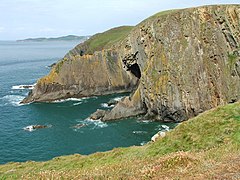Baggy Point
| Baggy Point | |
|---|---|
 | |
 Baggy Point Location within Devon | |
| OS grid reference | SS426403 |
| Shire county | |
| Region | |
| Country | England |
| Sovereign state | United Kingdom |
| Police | Devon and Cornwall |
| Fire | Devon and Somerset |
| Ambulance | South Western |
Baggy Point is a headland in north Devon, England. It separates Croyde Bay and Morte Bay which includes the beaches of Woolacombe and Putsborough.

There is evidence of human occupation from the Mesolithic era. It was used during World War II by American forces training for the Normandy Landings.[1] The land has been owned by the National Trust since 1939 when it was donated Constance and Florence Hyde.[2][3]
Baggy Point forms part of the North Devon Coast Area of Outstanding Natural Beauty (AONB) and the Site of Special Scientific Interest (SSSI).[4][5] The SSSI designation is for both geological and botanical interest. The geological interest is in the Upper Devonian Sandstones.[5] The fauna in the rocks is poor but contains bivalves, possibly of brackish to freshwater affinities, and plant remains.[6] The botanical designation is for maritime heathland, grassland and lichens.[5][7] Lichens which are common in this SSI but unusual elsewhere include Pannaria microphylla, Pannaria nebulosa, Squamarina crassa and the rare Lecania ralfsii.[5]
The birds which can be seen at Baggy Point include guillemots, razorbills, Dartford warblers, stonechats and cormorants. Seals are often seen swimming around the point and the grazing land is used by Hebridean sheep and Ruby Red cattle which have been introduced to keep down the brambles, gorse and bracken.[8] The National Trust have also laid out a variety of walking and cycling trails.[9]
The sandstone rocks are popular with climbers.[10] The climbing routes range in difficulty. Some cannot be accessed at high tide.[11]
References[]
- ^ "A Walk Round Baggy Point (Newsletter No 10 2005)". North Devon Archeological Society. 2005. Archived from the original on 4 October 2011. Retrieved 9 October 2010.
- ^ "West Country coasts". National Trust. Archived from the original on 6 July 2008. Retrieved 3 August 2008.
- ^ "75 years caring for Baggy Point". National Trust. Archived from the original on 3 December 2017. Retrieved 7 March 2020.
- ^ "North Devon Coast". North Devon Coast AONB. Archived from the original on 20 September 2019. Retrieved 7 March 2020.
- ^ a b c d "Saunton to Baggy Coast" (PDF). Educational Register of Geological Sites. Devon County Council. Archived (PDF) from the original on 18 May 2011. Retrieved 3 August 2008.
- ^ "Summary of the geology of the Phase 2 part of the North Devon AONB and its immediate surroundings" (PDF). North Devon AONB. Archived from the original (PDF) on 5 October 2007. Retrieved 3 August 2008.
- ^ "Croyde Action Plan" (PDF). North Devon Local Plan. North Devon Council. Archived from the original (PDF) on 8 September 2008. Retrieved 3 August 2008.
- ^ "Wildlife on Baggy Point". National Trust. Retrieved 7 March 2020.
- ^ "Activities at Baggy Point". National Trust. Archived from the original on 24 November 2017. Retrieved 7 March 2020.
- ^ "Baggy Point". Climbing Database. UK Climbing.com. Archived from the original on 13 December 2006. Retrieved 3 August 2008.
- ^ "Baggy Point". UK Climbing. Archived from the original on 12 March 2016. Retrieved 7 March 2020.
External links[]
- Villages in Devon
- Headlands of Devon
- National Trust properties in Devon
- Bristol Channel
